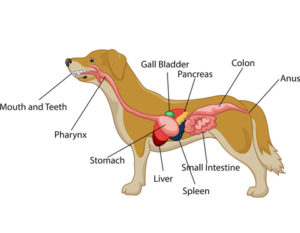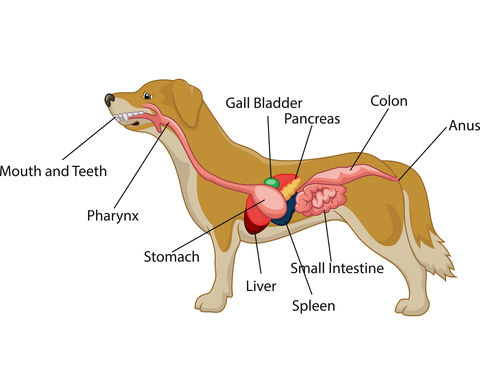My neighbor recently passed away from gastric cancer, which I had documented with several posts on my Facebook page. Her disease caught my attention since I was also blogging about the book Heal The Vital Role in the Search for Cancer Cures which is about cancer research in dogs, but the author interwound her sister’s experience with gastric cancer. 
Dogs can also develop gastric cancer although common, it accounts for less than 1% of malignant cancers. It is very rare in cats.
Gastric cancer typically involves internal bleeding, which may be observed as digested blood (black stools) or vomiting blood.
Causes
Although some breeds seem more susceptible, the link appears weak since the reports listed below mention different breeds. Some similarities occur in both humans and dogs. These include:
- It affects males more often than females
- It affects older individuals (in dogs the median age is 9.5 years)
- It has often been associated with the prolonged use of food containing pickling salts (nitrosamines).
Types
As with most cancers, there are benign and malignant forms. Malignant forms include adenosarcoma, lymphoma, mast cell tumors, and leiomyosarcoma.
- Adenosarcoma accounts for the vast majority of stomach cancers and originates in the lining of the stomach. It frequently spreads to the lymph nodes.
- Lymphoma originates from the white blood cells and this type of cancer can spread throughout the body. Gastric lymphoma accounts for 7-24% of gastric cancers.
- Mast cell tumors originate from the immune system and can occur in many parts of the body.
- Leiomyosarcoma are tumors that can occur on several organs.
Symptoms
Unfortunately, with both people and dogs, by the time symptoms occur the gastric cancer is already well advanced.
 Common symptoms include:
Common symptoms include:
- Vomiting – with tinges of blood
- Stools that contain blood, either digested blood (black) or fresh blood (red)
- Lack of appetite
- Loss of weight
Other symptoms may include signs of pain:
- Vocalization (whining, moaning, or growling)
- Licking or scratching
- Appearing lethargic or depressed
- Sensitivity to touch
- Urinating or defecating in the house
Diagnosis
Stomach cancer typically has generalized symptoms. Diagnosis often occurs after a dog receives an endoscopy, which is used to video the inside of the stomach. An x-ray combined with ingesting a barium solution to allow for contrast photography is another method; however, it is not as sensitive as endoscopy. A biopsy will determine the type of tumor, but usually occurs after the tumor has been removed.
The veterinarian may want to perform other tests to determine the dog’s health and if the cancer has spread to other organs. These tests may include bloodwork, urinalysis, x-rays, and an ultrasound.
Treatments
As with most cancers, the best treatment is surgical removal of the tumor along with part of the stomach and a small section of the small intestines. Chemotherapy involves intravenous injection every few weeks for a total of four or five rounds of treatment. Dogs do not lose their fur from chemo since the treatment for dogs is typically milder than for humans. The goal for dogs is to prolong their lives for a few years, while for humans, it is to prolong it for decades.
Prognosis
The prognosis of stomach cancer is poor since 76% of dogs with adenocarcinoma have metastaticcancer by the time it is diagnosed. One report listed below states the median survival rate for adenosarcoma is only 2 months, while another lists the mean at 8.5 months on a very limited sample size. Most dogs survive less than 6 months.
Please send me your story if you have had a dog with gastric cancer at Sandy@Caninecancerconcerns.com or visit my contact page.
If you have had a dog that has had cancer of any type, please send me your story following the general format that includes symptoms, diagnosis, care and lessons learned.
To learn more about canine gastric cancer, visit these sites:
https://bluepearlvet.com/medical-articles/cancer-of-the-stomach/
http://www.petmd.com/dog/conditions/cancer/c_dg_adenocarcinoma_stomach_intestine_rectal
http://wearethecure.org/learn-more-about-canince-cancer/canine-cancer-library/gastric-cancer/
http://www.petcancercenter.org/Veterinary_Oncologists_US_p1.html#WI
http://dogs.lovetoknow.com/wiki/Canine_Stomach_Cancer

